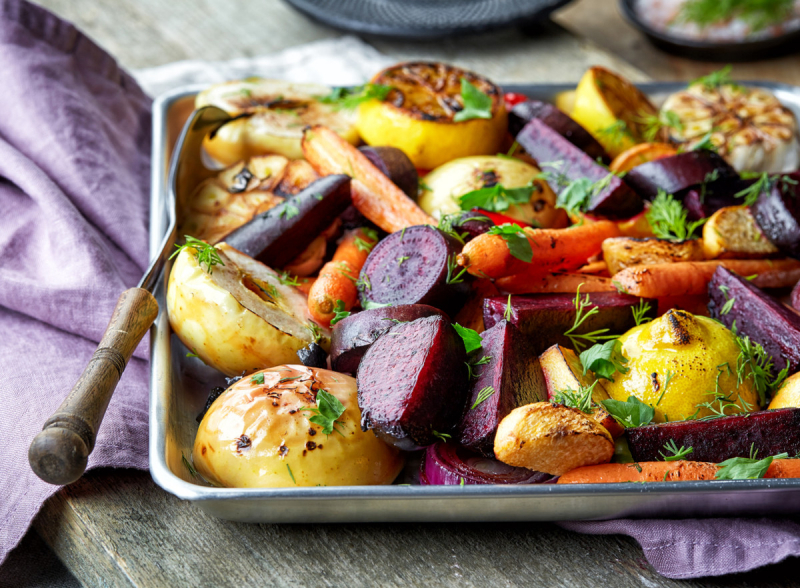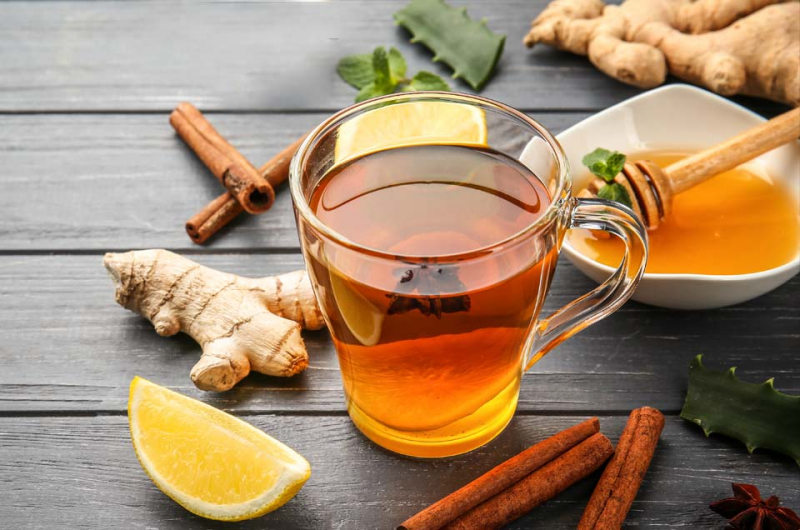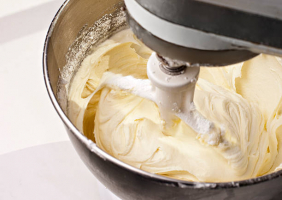Top 6 Ayurvedic Tips To Strengthen Your Immune System During Winter
Ayurvedic medicine, often known as "Ayurveda," is one of the world's oldest holistic healing systems. It was invented in India almost 3,000 years ago. It is ... read more...founded on the idea that health and wellness are dependent on a delicate balance of the mind, body, and spirit. Its primary purpose is to promote health rather than to combat sickness. However, treatments may be tailored to individual health issues. It is classified as complementary and alternative medicine in the United States (CAM). Ayurvedic practitioners believe that winter illnesses are caused by colder, drier circumstances that allow viruses to thrive. Cold-weather ailments are also exacerbated by winter stagnation and sluggish digestion. Here are 6 Ayurvedic tips to strengthen your immune system during winter.
-
The classics advise us to get up during the "ambrosial hours" in the morning, between 3 and 6 a.m. This is a vata time of day; the atmosphere is imbued with lightness and purity, allowing us to awaken more easily. Furthermore, this time of day is said to be the most conducive to connecting with our deepest inner nature and consciousness. Therefore, beginning your day correctly is one of the most effective Ayurvedic tips to strengthen your immune system during winter.
Whatever time works best for you, your daily routine will be most useful if you wake up at the same time every day. We often spend the dark winter mornings in bed. Because the morning hours are kapha, your body may resist getting up. Therefore, you should begin your day correctly by trying to get up before 7 a.m. to avoid feelings of lethargy and heaviness.
Scrape tongue is a simple hygiene practice that removes bacteria and toxins that have accumulated on the tongue overnight. It also serves to stimulate and cleanse the digestive tract and vital organs. So while tongue scraping is considered an important element of daily oral hygiene, it also supports the natural detoxification of the system at large. Another benefit of scraping the tongue is that it allows us to take notice of the coating on our tongues each morning and to begin to see how our dietary choices and lifestyle habits influence our overall health from one day to the next. A tongue cleaner made of stainless steel is balancing for all doshas. When you are finished, rinse with clean water and spit.
Ayurveda recommends cleaning the teeth with herbs that promote oral health, which are typically bitter, astringent, or pungent in taste. Try Tooth Powder, a powdered blend of Ayurvedic herbs and minerals, including neem, amalaki, miswak, and charcoal, that leave your mouth feeling clean, polished, and refreshed.

thelist.com 
ayurveda-products.eu -
It is said that swishing and gargling with warm oil lend strength to the teeth, gums, jaw, and voice while improving the sense of taste. Spit the oil out after you have held and swished it in your mouth for the desired period of time.
This practice can be done briefly, for 1-2 minutes, or for as long as 15 minutes. If a longer swish and gargle is appealing, consider doing it during abhyanga, or while completing other aspects of your morning routine.
Gargling with warm oil can soothe a sore throat, whiten teeth, and reduce gum inflammation. In the winter, Gargling with warm oil may help a sore throat in several ways. It can help your body fight off bacterial infections that often cause sore throats.
Essential oils are an alternative remedy for sore throat. Studies have shown that many essential oils have antibacterial, anti-inflammatory, and antiviral properties. Still, more research is needed to determine how effective they are. In the meantime, drinking a cup of warm peppermint or ginger tea with lemon and honey may be a safer way to enjoy the benefits of these plants.

yurielkaim.com 
livescience.com -
Warm food is recommended as the first meal of the day by Ayurveda to stimulate the digestive system. Eating a warm breakfast in the morning is vital according to Ayurveda to prepare the body for digesting the largest meal of the day - lunch. The old medical practice views the Sun to be the source of our metabolism, and because it shines the brightest between 12 and 2 p.m., it is said to be the best time to have lunch.
The metabolism requires a mild jumpstart in the morning, and a warm meal aids digestion and prepares your gut for the day ahead. The sun rises in the morning, and so does our Agni (digestive fire/appetite). According to Ayurveda specialist Dr. Dixa Bhavsar, it is not working to its full potential. So, in order to prepare our gut to digest the meals throughout the day, a light and warming breakfast is recommended because it is easy to digest and prepares your gut for optimum digestion. The expert compares a warm breakfast to a warm-up workout for the digestive fire, which we undertake to prepare our bodies for the major activity, which is digesting a meal that requires greater strength.
It is preferable to avoid chilled beverages and cold food during the winter because they may have a detrimental effect on the immune system. Choosing prepared foods and warm beverages can help to completely balance the Vata and Kapha for the season.

shape.com 
originmagazine.com -
Things slow down in the winter, creating a heavy and stagnation environment. It is critical to stimulate the body in order to overcome this sensation. Yoga is one of the healthiest winter ideas for stimulation. Morning and evening practice - When the Kapha dosha is dominant, different sections of the day have different energies. When your energy level is high, you feel active, and when your energy level is low, you feel slower. It is best to practice when the energy level is high. Mornings from 6 a.m. to 10 a.m. and evenings from 6 p.m. to 10 p.m. are the best times to practice yoga.
Because it is winter, many of you may feel relaxed movements; nonetheless, it is critical to offset the chilly weather with heated heat-producing movements. Begin your practice with a few Surya Namaskar and progress to a Vinyasa. Supta Baddha Konasana or Reclining Bound Angle Pose, Balasana or Child's Pose, Sucirandhrasana or Eye of the Needle Pose, Anjaneyasana or Low Lunge, Prasarita Padottanasana or Wide-Legged Forward Bend, Eka Pada Rajakapotasana or Pigeon Pose are some yoga poses to practice throughout winter.
Exercise regularly is one of the most useful Ayurvedic tips to strengthen your immune system during winter. A gradual and strengthening workout regimen will help to balance the Vata in the environment. To balance out the Kapha, you can choose a more physically demanding and lengthier workout regimen. It is critical to pay attention to the body's cues. If you're feeling fatigued, try Vata-calming exercises like walking or gentle yoga, whereas if you're feeling sluggish and heavy, try a more active regimen like jogging or skiing.

healthshots.com 
ahealthiermichigan.org -
One of the most useful Ayurvedic tips to strengthen your immune system during winter is having a warming diet. To maintain a healthy diet during the winter, consider foods that are natural Ayurvedic immune boosters. Fresh, organic, easily digestible, and healthy foods are immune-boosting. Winter meals that are easily digestible are good for boosting immunity. It is also critical to avoid commercially processed foods, foods containing chemicals and preservatives, and foods that are canned, frozen, or packaged. This is because they interfere with the digestive and immune systems' functions.
Warm, lightly prepared, less greasy, and spicy foods should also be included in your winter menu. Sweet (Madhura), Salty (Lavana), Pungent (Katu), Sour (Amla), Bitter (Tikta), and Astringent are the six distinct flavors mentioned in Ayurveda (Kashaya). Each of these tastes is made up of two unique components. Although winter foods should have a variety of flavors, your winter diet should emphasize sweet, sour, and salty flavors over astringent, bitter, and pungent flavors.
Home-cooked foods are some of the best winter season foods, as long as they are not deep-fried and are prepared with light oils like ghee or olive oil. You should also avoid eating cold food and drinking cold beverages in favor of eating warm food and drinking room-temperature beverages. This will assist in keeping your digestive fire burning and your body warm.
Tea is another wonderful food for the winter season since it aids digestion. After meals, you can enjoy a cup of tea. Other winter healthy foods include heat-producing vegetables like radish, onions, carrots, and spinach, as well as hot spices like garlic, ginger, black pepper, and chili pepper. In the winter, you can supplement your diet with cooked grains such as oats, barley, tapioca, and cornmeal. Furthermore, legumes are beneficial to Kapha and should be taken with ghee to mitigate the effects of Vata. Eggs and meats such as chicken, venison, and turkey are also healthy winter foods.

organicauthority.com 
religionworld.in -
Cold wind may wreak havoc on your skin during the winter if necessary precautions are not followed. It can dry and dull the skin by removing moisture and shine. According to Ayurveda, the earth is in the dakshinayana phase, which is the universe's feminine phase and the season of renewal. Pampering your skin with nutritious plant elixirs to repair and regain its lost splendor is, therefore, a must-do for winter skincare.
Ayurvedic formulations mostly contain botanicals, herbs, and natural essences. These formulations or remedies, which were meticulously left down by forefathers, take advantage of the extraordinary benefits of time-tested components.
Dry brushing, or garshana, is a wonderful winter self-care exercise for ridding the body of toxins and promoting ojas (pronounced gar-shun-uh). Garshana stimulates lymphatic drainage and eliminates ama, or cellular waste products, from the body. Traditionally done with raw silk or linen gloves, this can now be done with a natural bristle body brush. Garshana should be performed in the morning before bathing. Massage from the feet up toward the body and head, using circular strokes on joints like the elbows and knees and lengthy strokes on the arms and legs.
Dry brushing can be followed by an oil self-massage called abyhanga in Ayurveda. Because our skin is drier in the winter, performing abhyanga a few times a week works wonders to nourish the skin. Furthermore, self-massage relaxes the nervous system, increases health, and promotes a general sense of comfort and well-being. Therefore, you should have a careful winter skincare routine by using our useful Ayurvedic tips to strengthen your immune system during winter above.

biphaayurveda.com 
ayurvedicwellness.center



























